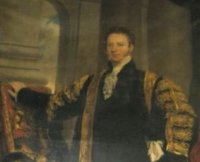William Vesey-FitzGerald, 2nd Baron FitzGerald and Vesey facts for kids
Quick facts for kids
The Lord FitzGerald and Vesey
|
|
|---|---|
 |
|
| President of the Board of Trade | |
| In office 11 June 1828 – 2 February 1830 |
|
| Monarch | George IV |
| Prime Minister | The Duke of Wellington |
| Preceded by | Charles Grant |
| Succeeded by | John Charles Herries |
| President of the Board of Control | |
| In office 23 October 1841 – 17 May 1843 |
|
| Monarch | Victoria |
| Prime Minister | Sir Robert Peel, Bt |
| Preceded by | The Lord Ellenborough |
| Succeeded by | The Earl of Ripon |
| Personal details | |
| Born | 24 July 1783 |
| Died | 11 May 1843 (aged 59) Belgrave Square, London |
| Nationality | Anglo-Irish |
| Political party | Tory |
| Alma mater | Christ Church, Oxford |
William Vesey-FitzGerald, 2nd Baron FitzGerald and Vesey (born July 24, 1783 – died May 11, 1843) was an important Anglo-Irish politician. He was a member of the Tory political party. He worked in the governments led by Lord Wellington and Robert Peel. He is most famous for losing an election in 1828. This loss helped speed up a big change called Catholic Emancipation in Britain and Ireland.
Contents
Early Life and School
William Vesey-FitzGerald was the older son of James FitzGerald and Catherine. His mother was the 1st Baroness FitzGerald and Vesey. He went to Christ Church, Oxford University for his education. His family had roots in both Old English and Gaelic Irish history.
His Time in Politics
FitzGerald first became a member of Parliament in 1808. He represented the area of Ennis. He held this seat for a few years, sometimes being replaced by his father and then returning.
In 1810, he was rewarded for helping with an important court case. He was given roles like a Lord of the Irish Treasury. This meant he helped manage money for the government in Ireland. He also joined the Irish Privy Council, a group of important advisors to the King.
Later, in 1812, he joined the British Privy Council. He also became a Lord of the Treasury in England. This was another key role in managing the country's money. He was also the Chancellor of the Irish Exchequer, which was like being the finance minister for Ireland.
In 1820, FitzGerald became the Member of Parliament for Clare. He also served as the Ambassador to Sweden. He tried to get money back from the Swedish King that had been given during the Napoleonic Wars. But he was not successful and returned to Britain in 1823.
Between 1826 and 1828, he worked as the Paymaster of the Forces. This was another important government job.
The Clare Election of 1828
In 1828, the Duke of Wellington made FitzGerald the President of the Board of Trade. This meant he was in charge of trade for the country. To take this new job, he had to run for election again in his Clare constituency.
However, he lost this election to Daniel O'Connell. This election was very important for Irish history. O'Connell was a Catholic, and at that time, Catholics were not allowed to be Members of Parliament. O'Connell's win showed how strong the demand for Catholic Emancipation was. This was a movement to give Catholics equal rights. FitzGerald's defeat helped lead directly to this big change.
Even though he lost in Clare, FitzGerald was elected to Parliament for other areas. He continued to serve as President of the Board of Trade until 1830.
Becoming a Lord
In 1832, FitzGerald inherited a title from his mother, becoming the second Baron FitzGerald and Vesey. This was an Irish peerage. It did not give him a seat in the House of Lords, which is the upper house of the British Parliament.
However, in 1835, he was given a new title: Baron FitzGerald. This was a United Kingdom peerage. This new title meant he could take a seat in the House of Lords.
He served in government again from 1841 to 1843. He was the President of the Board of Control under Sir Robert Peel. This role involved overseeing affairs in India.
Besides his political work, FitzGerald was also the Lord Lieutenant of County Clare. This was a high-ranking official role in his home county. He was also a trustee of the British Museum and a Fellow of the Society of Antiquaries.
Family Life
Lord FitzGerald and Vesey passed away in May 1843, when he was 59 years old. He was never married. Because he had no children, the barony he was given in 1835 ended when he died. His younger brother, Henry, inherited the Irish title. William Vesey-FitzGerald also had an illegitimate son, Sir William Vesey-FitzGerald, who later became a successful politician himself.
 | Emma Amos |
 | Edward Mitchell Bannister |
 | Larry D. Alexander |
 | Ernie Barnes |

